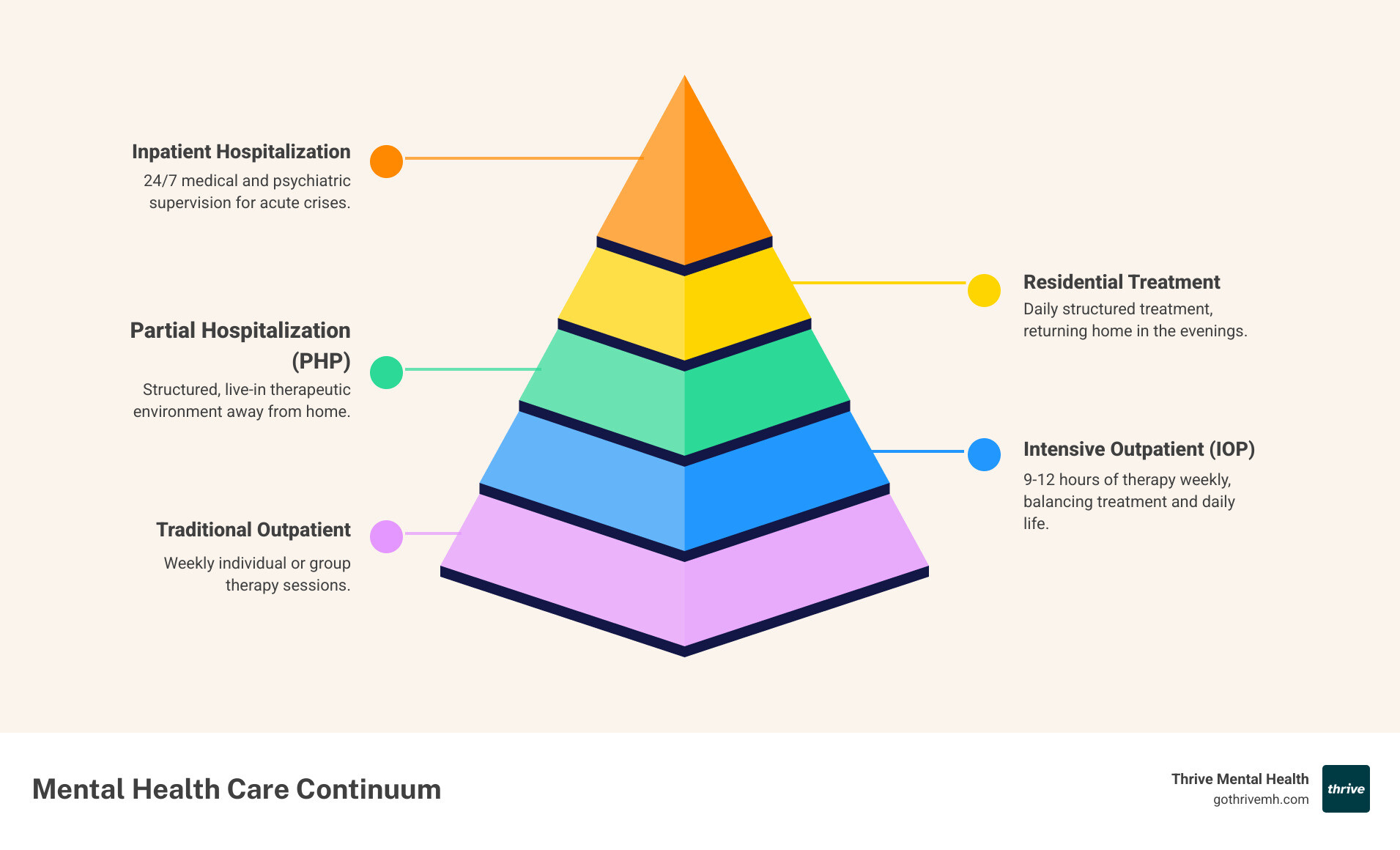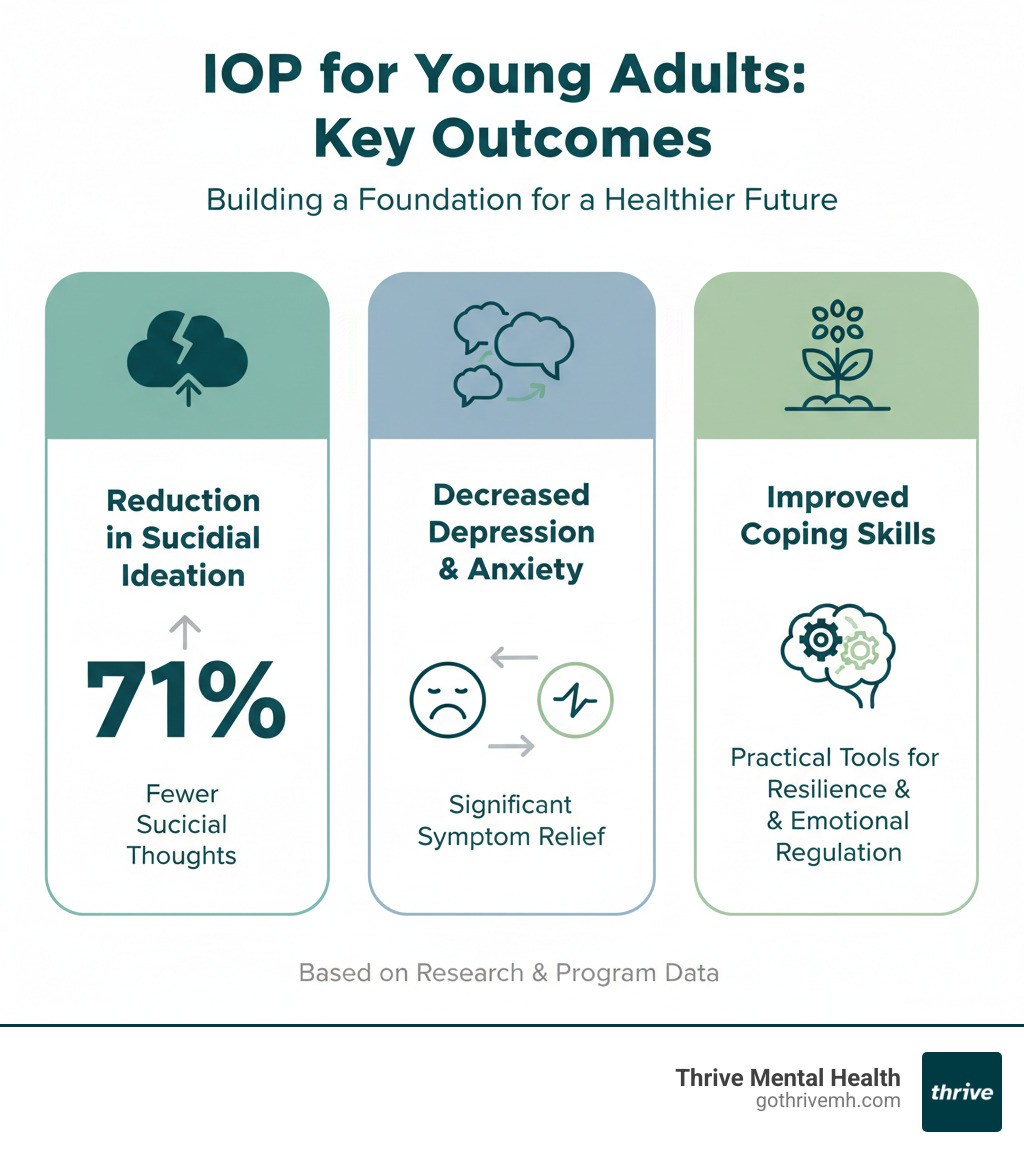Young, Anxious, and Overwhelmed? Discover Intensive Outpatient Programs

IOP for young adults: Your 2025 Lifeline
A Lifeline for the Pressures of Young Adulthood
IOP for young adults offers a structured middle ground between weekly therapy and hospitalization, providing 9-12 hours of treatment per week while allowing you to maintain work, school, and daily responsibilities.
Quick Answer for IOP for Young Adults:
- What it is: Intensive Outpatient Program with group therapy, individual counseling, and psychiatric support
- Time commitment: 9-12 hours per week, typically 3-5 days
- Best for: Ages 18-26 struggling with depression, anxiety, trauma, or other mental health challenges
- Key benefit: Treatment flexibility that fits around your schedule
- Duration: Usually 8-12 weeks based on individual progress
The transition to adulthood brings unique pressures like college stress, career decisions, and financial responsibilities. It’s no surprise that youths ages 16 to 26 have the highest occurrence for mental illness compared to other age groups.
If you’re overwhelmed by anxiety or depression and weekly therapy isn’t enough, you’re not alone. Many young adults need more support than traditional outpatient care but don’t require inpatient treatment. That’s where Intensive Outpatient Programs (IOPs) come in, bridging the gap with structured, evidence-based treatment that fits your life.
I’m Anna Green, LMHC, LPC, Chief Clinical Officer and founder of Thrive Mental Health. I’ve developed virtual-first IOP for young adults programs that prioritize access and outcomes for young adults across Florida, and I’ve seen how transformative the right level of care can be for emerging adults.

IOP for young adults vocabulary:
What is an IOP? A Structured Path to Healing for Young Adults
An IOP for young adults is intensive mental health treatment that provides comprehensive support without pulling you completely away from your life. It’s designed for that middle ground where regular therapy isn’t enough, but you don’t need 24/7 supervision. You continue with work, school, and daily responsibilities while receiving a higher level of care.
IOPs can serve as a “step-down” from inpatient or residential care, providing a bridge back to independent living. They can also be a direct admission when outpatient therapy alone isn’t sufficient to manage your symptoms.
The program’s flexibility is its core strength—you get intensive support that works around your schedule. At Thrive Mental Health, our Florida-based IOP programs are designed with young adults in mind. For a comprehensive look at how IOPs work, check out our guide on Mastering Intensive Outpatient Programs: Your Complete Guide.
Who is an IOP for?
IOP for young adults is designed for people aged 18-26 whose mental health challenges significantly impact daily life. You might be a good fit if you’re struggling to function at school or work, your relationships are suffering, and weekly therapy isn’t providing enough support.
The key factors for success are being able to maintain safety outside of program hours and having the motivation to actively engage in treatment. An IOP is ideal whether you’re stepping up from traditional therapy or stepping down from a higher level of care.
What Conditions Does an IOP for Young Adults Treat?
IOP for young adults programs address the mental health conditions that commonly emerge during this life stage, including:
- Depression and Anxiety: Persistent sadness, loss of interest, overwhelming worry, or panic attacks that interfere with daily life.
- Trauma and PTSD: Specialized care to safely process traumatic experiences and develop healthy coping strategies.
- Bipolar Disorder: Structured support to manage mood swings, from depressive lows to manic highs.
- Self-Harm and Suicidal Thoughts: Intensive monitoring and skill-building to develop safer coping mechanisms and create robust safety plans.
- Co-occurring Substance Use Issues: Many IOPs offer dual-diagnosis tracks to address both mental health and substance use simultaneously.
- Eating Disorders: A multidisciplinary approach for anorexia, bulimia, and binge eating disorder, often including nutritional counseling.
- Borderline Personality Disorder (BPD): A structured environment to learn emotional regulation, interpersonal effectiveness, and distress tolerance skills.
- “Failure to Launch” Challenges: Addressing developmental problems like transitioning to independence and managing adult responsibilities.
[Callout Box] In Crisis? You Are Not Alone. If you are having thoughts of harming yourself, please call or text 988 immediately to connect with the Suicide & Crisis Lifeline.
The IOP Experience [2025]: What a Typical Week Looks Like
Imagine sitting in a supportive group session, finally talking through the anxiety that’s been building all semester. This is what a week in an IOP for young adults looks like—intensive healing that fits into your life.
Most programs require 9-12 hours per week, spread across 3 to 5 days. Many offer evening sessions designed for young adults juggling school or work. You’re not pausing your life to get better; you’re learning to thrive while living it.
At Thrive Mental Health, we’ve seen how this balance transforms outcomes for young adults across Florida. When you can practice new coping skills in real-life situations, the healing becomes lasting. For a deeper dive, check out What to Expect in an Intensive Outpatient Program.

Core Components of an IOP for Young Adults
Every IOP for young adults is built on key therapeutic elements:
- Individual Therapy: One-on-one sessions with your primary therapist to dig into personal challenges and set goals.
- Group Therapy with Peer Support: A powerful community where you connect with others facing similar struggles, reducing feelings of isolation.
- Family Therapy and Education: Involving family to improve communication and build a stronger support system at home, which research shows is a strong predictor of success.
- Psychiatric Evaluation and Medication Management: Expert guidance on medication from a provider who works closely with your therapy team.
- Life Skills Development: Practical workshops on “adulting” skills like budgeting, career planning, and time management to build confidence and independence.
Evidence-Based Therapies You’ll Encounter
Quality IOP for young adults programs use therapies backed by solid research:
- Cognitive Behavioral Therapy (CBT): A practical approach to identify and change negative thought patterns that fuel anxiety and depression.
- Dialectical Behavior Therapy (DBT): Teaches core skills in mindfulness, distress tolerance, emotion regulation, and interpersonal effectiveness, which is highly effective for young adults with intense emotions.
- Acceptance and Commitment Therapy (ACT): Helps you accept difficult thoughts and feelings while committing to actions that align with your values.
- Motivational Interviewing: Explores your own motivations for change, which is crucial as you define your identity in young adulthood.
- Experiential Therapies: Uses modalities like art or music therapy to express emotions that are difficult to put into words.
All care is delivered through a trauma-informed lens, recognizing that past experiences often shape current mental health.
IOP vs. Other Care Levels: Finding Your Right Fit
Choosing the right level of mental health care can feel overwhelming. Think of it like choosing the right tool for a job. IOP for young adults sits perfectly in the middle of the care spectrum, offering more support than weekly therapy but less intensity than round-the-clock supervision.
Here’s how different levels of care stack up:
| Feature | Inpatient Care | Partial Hospitalization Program (PHP) | Intensive Outpatient Program (IOP) | Traditional Outpatient Therapy |
|---|---|---|---|---|
| Hours/Week | 24/7 (Live-in) | 20-35+ hours/week (Day program) | 9-12 hours/week (Flexible, often evenings) | 1-2 hours/week |
| Living Situation | Facility-based | Live at home | Live at home | Live at home |
| Intensity | Highest (Crisis stabilization, acute care) | High (Structured, daily therapeutic environment) | Moderate (Significant support, skill-building) | Low (Maintenance, ongoing support) |
| Ideal Candidate | Imminent danger, severe symptoms, needs constant supervision | Requires intensive daily treatment but is medically stable | Needs more than weekly therapy, can function at home | Mild to moderate symptoms, needs ongoing support |
IOP for young adults hits that sweet spot where you get substantial support without your life grinding to a halt. For a deeper dive into how IOP compares to PHP specifically, check out our detailed guide on IOP vs. PHP: Mental Health.
Key Benefit: Balancing Treatment with Real Life
The biggest game-changer with IOP for young adults is that you don’t have to pause your life to get better. This is crucial when every decision about your future feels monumental.
- Maintain School and Work: Flexible evening and weekend schedules allow you to keep up with classes and jobs without falling behind.
- Practice Skills in Real Time: You can immediately apply new coping strategies to real-world stressors—like a tough exam or a conflict with a roommate—and process the experience in therapy that same day.
- Build Independence with a Safety Net: You learn to steer adult responsibilities while having a team of experts to support you, building both competence and confidence.

Virtual vs. In-Person IOP: Which is Better?
The honest answer? It depends on you. Both virtual and in-person IOP for young adults are effective; the best choice fits your lifestyle and needs.
Virtual IOP has revolutionized access to care in Florida.
- Accessibility: Join from anywhere in Florida, from Miami to Jacksonville, eliminating commutes and geographical barriers.
- Convenience: The flexibility makes it easier to attend sessions, and some people feel more comfortable opening up from their own space. Explore our guide on Exploring the Benefits of Virtual Intensive Outpatient Programs.
In-person IOP offers a tangible sense of community.
- Connection: There’s a unique power in face-to-face interaction and non-verbal cues that helps some people connect more deeply.
- Structure: A dedicated treatment space can help you focus by removing distractions from your home environment.
At Thrive Mental Health, our virtual IOP for young adults in Florida offers unparalleled accessibility and convenience. Our team can help you determine if our online program is the right fit for you.
Navigating Logistics: Costs, Insurance, and Starting Treatment
Taking the first step towards an IOP for young adults can feel daunting, but understanding the practicalities doesn’t have to be. We’re here to guide you through the process.
How to Find and Choose the Right IOP in Florida
Finding a quality program in Florida starts with asking the right questions:
- Accreditation: Is the program accredited by a body like The Joint Commission?
- Specialization: Does it focus on young adults (18-26) and their unique challenges?
- Therapies: Does it use evidence-based modalities like DBT or CBT?
- Staff: What are the credentials of the clinical team?
- Structure: What is the schedule, and are there flexible virtual options for Florida residents?
- Aftercare: What support is offered after you complete the program?
The admission process usually starts with a clinical assessment to ensure an IOP is the right fit and to create your personalized treatment plan. For more tips, check out Finding Quality IOP Programs Near Me: A Guide.
Paying for IOP: Insurance Coverage in Florida
The cost of mental health treatment is a significant concern. The good news is that IOP for young adults is a covered benefit by most major health insurance plans in Florida. At Thrive Mental Health, we are in-network with a wide range of providers, including Florida Blue, Cigna, and Optum, to make care accessible. We also accept Florida Medicaid for covered IOP services.
Our admissions team specializes in Florida insurance plans and can verify your benefits and outline any co-pays or deductibles. We’re committed to making quality care accessible to young adults throughout the Sunshine State.
Does IOP for Young Adults Actually Work? Outcomes and Life After Treatment
The effectiveness of IOP for young adults is well-supported by research, demonstrating significant improvements in mental health and overall well-being. This isn’t just about managing symptoms; it’s about building a foundation for a healthier future.
- Reduced Depression and Anxiety: Studies consistently show that IOP participants experience a substantial decrease in symptoms. For instance, a study on virtual IOPs found they significantly reduce depression, suicidal ideation, and self-harm behaviors. Notably, nearly 71% of participants who initially experienced suicidal thoughts no longer had them at discharge.
- Fewer Eating Disorder Symptoms: Research has shown that participants struggling with eating disorders experienced fewer symptoms after attending both virtual and in-person IOPs.
- Improved Coping Skills: IOPs equip young adults with practical, evidence-based coping mechanisms for greater resilience and emotional regulation.
- Positive Outcomes: At Thrive Mental Health, more than 91% of our clients see improvements in their most severe mental health symptoms, leading to an increased sense of well-being.

Life After Treatment: Step-Down Care and Aftercare
Completing an IOP is a significant achievement, but the journey doesn’t end there. Effective programs include comprehensive aftercare planning, such as:
- Step-Down Care: Transitioning to a lower level of support, like weekly outpatient therapy.
- Alumni Support Groups: Providing a community of peers for ongoing encouragement.
- Connecting with Community Providers: Helping you find long-term therapists and psychiatrists to maintain continuity of care.
The goal is to empower you with the tools and support systems needed to sustain your recovery.
Frequently Asked Questions about IOP for Young Adults
It’s natural to have questions when considering an IOP for young adults. Here are concise answers to the most common ones we hear.
How long does an IOP program typically last?
Most IOP for young adults programs last between 8 to 12 weeks. However, the exact duration is personalized to your individual progress and clinical needs. Your treatment team will work with you to determine the right length of stay and ensure you feel prepared before transitioning to a lower level of care.
Can I keep my current therapist or psychiatrist?
Yes. We encourage collaboration with your existing providers. Our IOP for young adults team will work with your current therapist or psychiatrist in Florida to ensure a coordinated approach and a seamless transition of care after you complete the program. This strengthens your support network rather than replacing it.
What is the role of family in an IOP?
Family involvement is crucial for lasting change. Most IOP for young adults programs include family therapy sessions and educational workshops. The goal is to improve communication, resolve conflicts, and create a supportive home environment that fosters long-term recovery. Family participation is a strong predictor of successful outcomes.
Will an IOP interfere with my school or work schedule?
No, it’s designed not to. IOP for young adults is built for flexibility. Many programs, including our virtual IOP in Florida at Thrive Mental Health, offer evening sessions that allow you to schedule treatment around your school or work commitments, so you don’t have to put your life on hold.
How do I know if I need an IOP versus regular therapy?
If weekly therapy isn’t enough to manage your symptoms, you’re struggling with daily functioning (at school, work, or home), or you’re dealing with co-occurring issues like substance use, an IOP for young adults may be the right next step. The best way to know for sure is to get a professional assessment, which can determine the appropriate level of care for your needs.
Your Path to Healing Starts Here in Florida
Young adulthood is tough, but you don’t have to steer it alone. The pressures and mental health challenges you’re facing are real, valid, and treatable. An IOP for young adults in Florida is a bridge to a healthier future, providing the tools to thrive without asking you to pause your life. You can continue with school, work, and relationships while building a strong foundation for your well-being.
Getting help isn’t giving up on independence—it’s investing in it.
At Thrive Mental Health, our virtual IOP for young adults in Florida is designed for your life, with flexible evening scheduling and in-network coverage from major insurance plans, including Florida Blue. We know you’re capable, and we’re here to provide the support that weekly therapy alone may not offer.
Ready for support designed for young adults in Florida? Verify your insurance in 2 minutes (no obligation) or call our Florida-based team at 561-203-6085 to speak with our admissions team. We can answer your questions and help you get started.
If you are in crisis, call or text 988 immediately. Help is available now.
Your path to healing starts with the decision to invest in yourself. We’re here to walk that path with you.